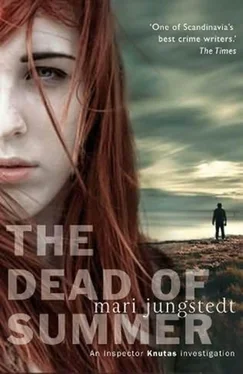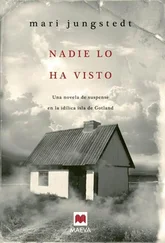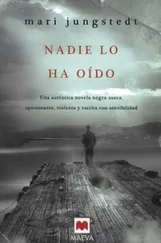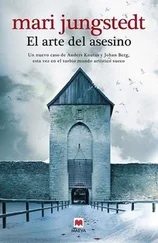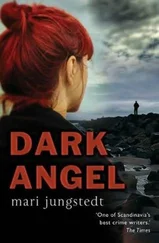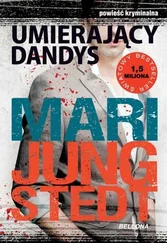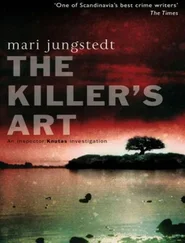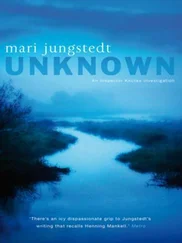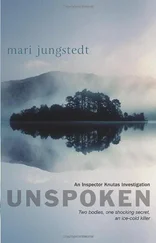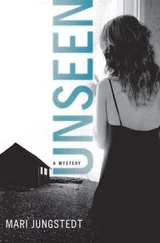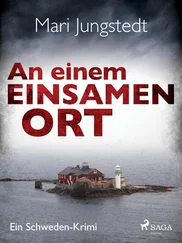RIGHT AFTER LUNCH on Tuesday, the three Estonians arrived at police headquarters, along with officers from the Estonian police force. An interpreter was summoned to help out if needed.
Knutas was not allowed to participate since he was a plaintiff in the incident that had occurred on Furillen. He caught a glimpse of the men as they were escorted to the interrogation room, and he recognized them at once. A wave of revulsion ran through his body. Maybe he’d been more affected by the experience than he thought.
The men were identified as Ants Otsa, Andres Sula and Evald Kreem. They were interviewed separately.
Jacobsson and Wittberg started with Ants Otsa, the owner of the van.
They took seats in one of the interrogation rooms on the ground floor of police headquarters. The arrested man sat on one side of the table, and Jacobsson sat across from him. As a witness to the interview, Wittberg sat in a chair a short distance away. Otsa was no more than twenty-three years old, and he seemed nervous. His English was good enough that they didn’t need an interpreter.
‘We had nothing to do with killing Peter. Nothing. You have to realize that,’ he insisted over and over again, even before the interview had begun.
‘OK, OK,’ Jacobsson admonished him. ‘Take it easy. Let’s take one thing at a time.’
She switched on the tape recorder, asked the usual introductory questions and then leaned back in her chair to study the young man’s face; he was clearly panic-stricken. He was blond, with a pale complexion, and his tongue was pierced. A pinch of snuff made his upper lip bulge on one side. His eyes were a watery light blue.
‘What have you been doing here on Gotland?’
‘I work in construction.’
‘Illegally?’
‘What do you mean?’
‘Do you have a work permit?’
‘No.’
‘How long have you been working here?’
‘About six months.’
‘Is Slite Construction the only company you’ve worked for?’
‘Yes.’
‘Tell us about the building project on Furillen.’
‘What?’
‘For instance, how many of you worked there?’
Otsa looked away.
‘I don’t really know. Three or four.’
‘OK. Why did you remove all the appliances from the house?’
The young man fidgeted uneasily.
‘Because we hadn’t been paid. We’d been working day and night for two months without getting an öre.’
‘Why hadn’t you been paid?’
‘Peter said he’d pay us, but he never did.’
‘But you got your wages in the beginning?’
‘Yes, back then he came out every two weeks and gave us the wages we’d agreed on. Later on, he started making excuses.’
‘Do you know why?’
‘He said he was waiting for money from someone else who was late in paying, and that we’d get paid soon, but we never did.’
‘Was Peter always the one who paid you?’
‘Yes.’
‘How did he give you the money?’
‘He came out to the building site.’
‘Were you paid in cash?’
‘Yes.’
‘How much?’
‘Eighty kronor an hour.’
‘But you haven’t been paid anything recently?’
‘No. We worked on several jobs for him, and we haven’t received any wages for the past two months.’
‘OK, let’s go back to that Sunday on Furillen. Why did you lock up Superintendent Knutas?’
‘We felt bad that we had to do that. But when we saw that he was a police officer, we got scared. We needed to go back home to our families. We have wives and children to support. We took the things from the house as payment for back wages.’
‘What about the beating?’ said Jacobsson. ‘What do you know about the assault on Vendela Bovide, Peter’s wife?’
Otsa looked like he’d been expecting the question.
‘It wasn’t something we’d planned. We were desperate, because we hadn’t been paid, and now Peter was dead. And that other guy, Johnny, said that he had nothing to do with the money. So the only one who could pay our wages was Peter’s wife. We’d heard that they had a safe at home. We didn’t intend to hit her, but Evald lost control.’
‘Evald? You mean he was the only one who hit her? While you two stood and watched? Or maybe you were comforting her two little children while he beat her?’
Jacobsson was infuriated by the man’s evasive answers.
Otsa lowered his eyes. ‘No. We didn’t think about the fact that she had little kids in the house. I’m sorry, but we were desperate. We didn’t know what to do.’
Jacobsson and Wittberg exchanged glances.
‘Do you own a gun?’
‘A gun? No.’ The man sitting across the table shook his head.
‘Do any of your friends own a gun?’
‘I don’t know.’
‘Where were you on the morning of 10 July, around six o’clock?’
‘I don’t know,’ said Otsa, and for the first time his voice shook.
‘Take your time and think about it,’ Jacobsson urged him.
‘On 10 July, that early in the morning? I was sleeping in the construction shack out on Furillen. That’s where we were staying. Well, I was probably up by then. We usually started work at seven.’
‘Is there anyone who can confirm your statement?’
‘Sure, my friends who are here with me. All three of us were out there.’
‘Are they the only ones?’
‘Yes, we were the only ones sleeping there.’
‘So there’s nobody else who can vouch for the truth of what you’re telling us?’
‘No.’
‘In other words, you don’t have an alibi for the time of the murder?’
Ants Otsa didn’t reply. He just stared straight ahead with a vacant expression.
GOTSKA SANDÖN, 21 JULY 1985
AS THE TWO sisters walked around Kyrkudden on Gotska Sandön and saw the waters of Franska Bukten ahead of them, they felt like explorers who had just come ashore on a deserted island .
There was no sign of any human habitation as far as the eye could see. The shoreline stretched out for several kilometres, making a soft curve of fine-grained sand all the way out to Tärnudden on the other side. Even though it was still before noon, the heat was already intense; the sun glittered on the water, and the only living creatures to be seen were a few black-backed seagulls strutting about on the beach. Some distance from shore and higher up was a belt of short-shafted reeds, and beyond them began a lowland pine forest. It would be hard to get much farther away from civilization .
They stopped for a moment to catch their breath. Their rucksacks were heavy, and their feet hurt after walking for three hours along the uneven shore, which alternated between sand and stones. They had left behind their campsite on the other side of the island, where people could pitch their tents or rent one of the few cabins available to tourists .
Oleg had been walking around in an elated state ever since they had come ashore on the island several days earlier. Gotska Sandön was more beautiful and more amazing than any of them could have imagined. They had seen the place where Oleg’s great-grandfather had drowned when the Russian ship, the Vsadnik, had sunk in a storm on an August night in 1864. They had visited the cemetery and admired the Russian cannons that were still on the beach called Franska Bukten. It was the girls’ favourite beach, and they had been given permission to spend the night there under open skies. Pitching a tent was not allowed .
They started making camp by laying out their sleeping bags in the middle of the beach and setting up a windbreak, even though there was only a light breeze. The weather forecast promised beautiful summer weather for the next few days, and almost no wind at all. One of their rucksacks was functioning as an insulated bag containing their dinner, which consisted of roast beef and potato salad .
Читать дальше
